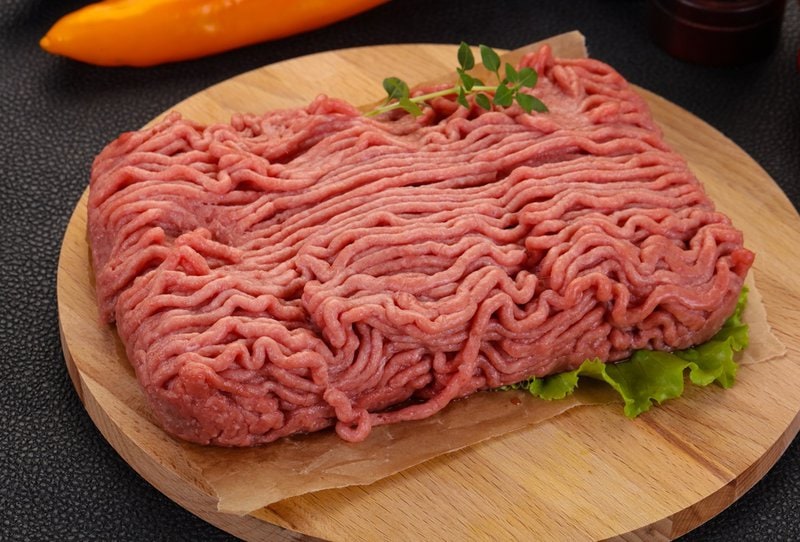It’s time for the year’s festive period, and the traditional ground turkey will be top of the menu, especially during this Thanksgiving holiday. But, you may wonder about giving your furry friend this tasty ground turkey, which may save you the stress of cooking other dog food. So, is it safe for dogs to eat ground turkey?
Yes, dogs can eat ground turkey, but it’s best to serve them plain turkey without seasonings. Ground turkey is made by grinding turkey parts through a meat grinder, and it can be added to your doggie’s food when fully prepared. But don’t give dogs turkey if they have food allergies or sensitivities that cause adverse reactions. If you’re uncertain whether your dog reacts well to turkey, consult a vet first.
This article discusses what foods you can safely add to turkey when feeding dogs, the proper serving size, and some benefits of turkey. We’ll also clarify what happens when dogs eat ground turkey and how ground turkey compares to other meats you might feed your furry friend. But first, let’s review safe ways to prepare ground turkey for pooches.
Can Dogs Eat Ground Turkey Raw?
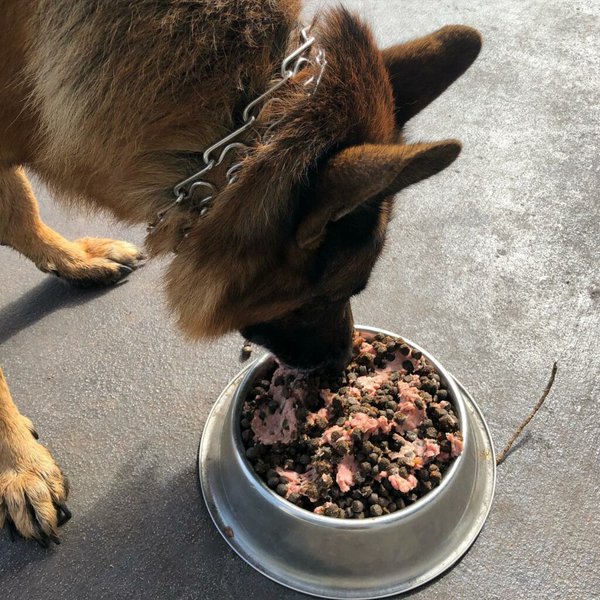
No, dogs can’t eat raw ground turkey or raw meat, which can cause Salmonella contamination or food poisoning.
Apart from food contamination, raw ground turkey is challenging to digest. So it’s best to cook ground turkey before feeding it to your doggie.
Can Dogs Eat Cooked Ground Turkey?
Yes, dogs can only eat cooked ground turkey. Raw meat is not safe for dogs.
Cooking ensures the meat is safe and easily digestible, as this method eliminates any possible bacteria with high heat.
Can I Feed My Dog Ground Turkey And Rice?
Yes, your dog can have a combination of ground turkey and rice in moderation.
Ground turkey, combined with rice or other dog food, provides an excellent protein source for a well-balanced doggie diet.
Can Dogs Eat Ground Turkey With Rosemary Extract?
Yes, dogs can eat ground turkey with rosemary extract. A preservative for commercially sold ground turkey, rosemary extract is harmless for dogs.
Rosemary extract slows the oxidation of the red pigment of ground turkey from red to brown. Give your dog 300 mg of rosemary extract for each kilogram of ground turkey.
What Happens If A Dog Eats Ground Turkey?
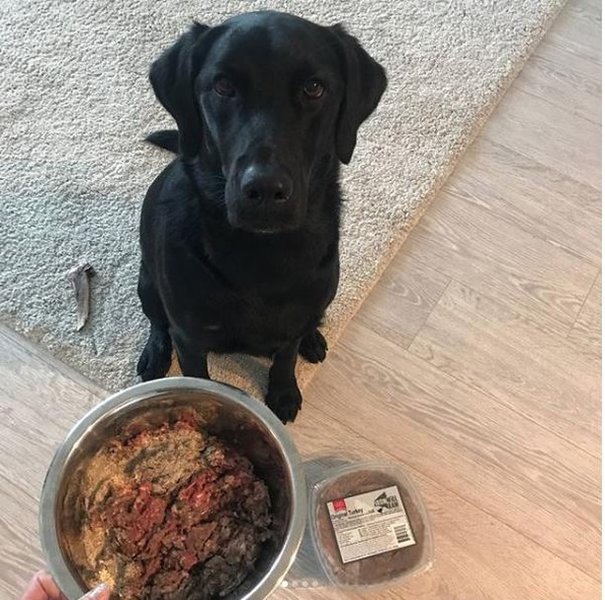
Thoroughly cooked ground turkey is harmless for dogs as long as they are not allergic to turkey.
However, suppose your canine friend eats raw ground turkey. In that case, it can cause adverse effects like stomach disturbances from food poisoning.
To avoid choking, always ensure that ground turkey does not contain any bones before feeding your Fido.
Is Ground Turkey Hard For Dogs To Digest?
No, ground turkey is not hard to digest. On the contrary, ground meat is typically easier to digest.
Ground turkey is easily digestible and provides your canine companion with protein to help build muscles.
Does Ground Turkey Make Dogs Sleepy?
No, there is no evidence that ground turkey makes dogs sleepy. Turkey is not potent enough to make a doggie fall asleep even though it is high in tryptophan.
If your dog is tired after eating ground turkey, it is most likely due to the stomach fill-up sensation. The tryptophan in the turkey doesn’t make your Fido sleepy.
Can Ground Turkey Make My Dog Sick?
No, ground turkey can’t make a dog sick. However, some dogs may not react well to ground turkey.
Likewise, dogs may not react well to ground turkey prepared incorrectly. For instance, dogs may have allergies or bad reactions to certain seasonings or raw turkey.
Some dogs are allergic to turkey and poultry products. If your doggie has any food allergies, it’s best to consult a veterinarian before letting your canine eat a new food. Food allergy signs include stomach aches and loss of appetite.
Also, turkey parts such as the skin, fats, and bones are unsuitable for your canine friend. The skin and fats can cause obesity and pancreatitis.
Ground turkey bones can cause mouth injury, choking, intestinal blockage, constipation, and splintering. Also, seasonings, such as butter, garlic, and onions, can cause vomiting and other bowel disturbances.
How Much Ground Turkey Can I Feed My Dog?
You should give your dog about 1 ounce of ground turkey per 25 lbs of your dog’s weight.
If you plan to include ground turkey in their regular diet, mix ½ cup of ground turkey and another ½ cup of dog food. You can feed dogs ground turkey mixed with kibbles, rice, or sweet potatoes.
Chopped parsley, basil, and pumpkin can also be included. However, don’t add seasonings like garlic, onions, or salt.
Can I Feed My Dog Ground Turkey Every Day?
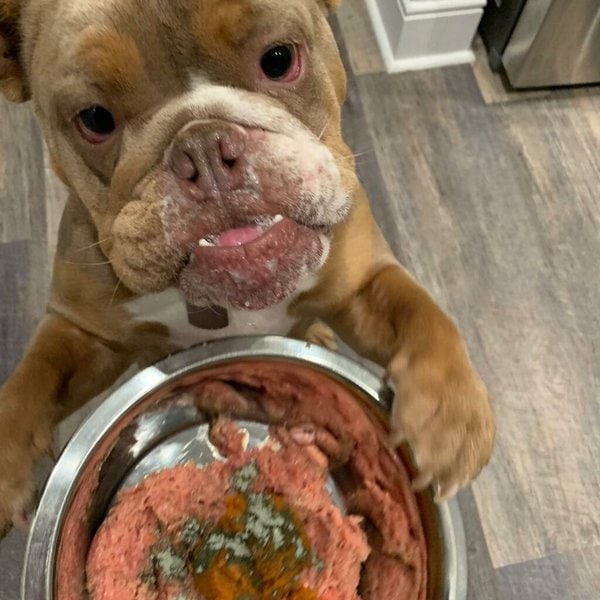
No, feeding your doggie ground turkey daily isn’t advisable. Too much can cause obesity and/or pancreatitis.
It will help if you alternate ground turkey with other protein sources, such as ground beef, ground chicken, and other animal or plant proteins.
Is Ground Turkey Better Than Ground Beef For Dogs?
Yes, ground turkey is safer and better than ground beef for dogs.
With ground turkey, you get less fat than ground beef, resulting in fewer weight problems in dogs.
Also, ground turkey has a finer texture than ground beef and is less expensive. On average, ground turkey costs $3 per pound, while ground turkey costs $5 per pound.
Is Ground Turkey Or Chicken Better For Dogs?
Ground turkey is better than ground chicken, although they have a similar flavor, nutritional content, and texture.
Ground turkey and ground chicken have similar prices of about $3 per pound of meat.
Nevertheless, ground turkey is healthier because it is a leaner meat type and comes with fewer calories and less sodium. Ground turkey also has more protein and iron than ground chicken.
Benefits Of Ground Turkey
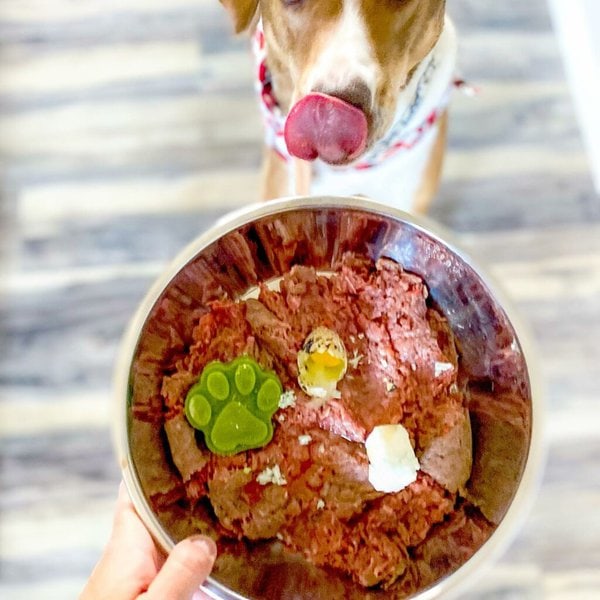
Ground turkey is a common ingredient in commercial dog foods like kibbles. When ground beef is unavailable, ground turkey is a suitable protein replacement.
Also, ground turkey is a better choice if your four-legged furry friend has an allergy to chicken or beef.
Finally, because ground turkey is an animal protein, it has a good amount of vitamin B3, zinc, iron, phosphorus, vitamin B6, potassium, and selenium. These nutrients are required for your dog to live healthily.

